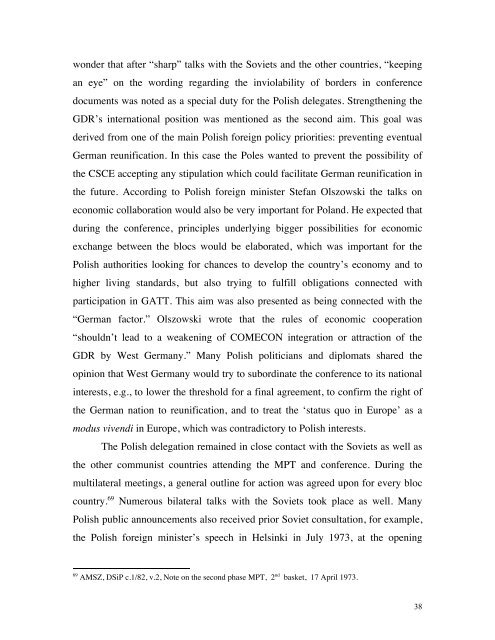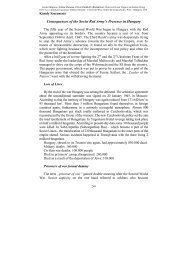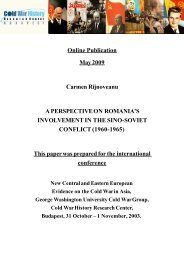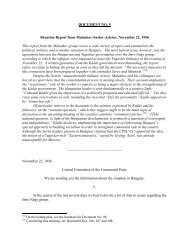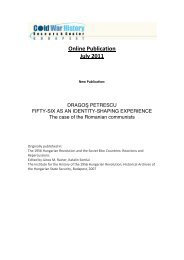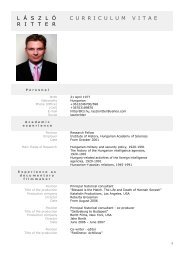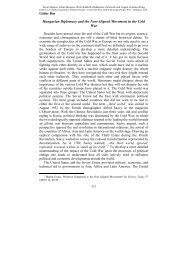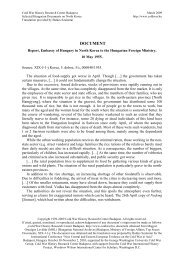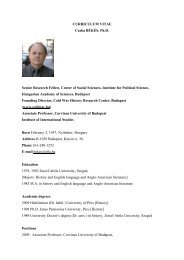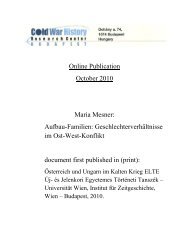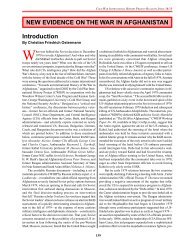Hope and Reality: Poland and the Conference on Security and ...
Hope and Reality: Poland and the Conference on Security and ...
Hope and Reality: Poland and the Conference on Security and ...
Create successful ePaper yourself
Turn your PDF publications into a flip-book with our unique Google optimized e-Paper software.
w<strong>on</strong>der that after “sharp” talks with <str<strong>on</strong>g>the</str<strong>on</strong>g> Soviets <str<strong>on</strong>g>and</str<strong>on</strong>g> <str<strong>on</strong>g>the</str<strong>on</strong>g> o<str<strong>on</strong>g>the</str<strong>on</strong>g>r countries, “keepingan eye” <strong>on</strong> <str<strong>on</strong>g>the</str<strong>on</strong>g> wording regarding <str<strong>on</strong>g>the</str<strong>on</strong>g> inviolability of borders in c<strong>on</strong>ferencedocuments was noted as a special duty for <str<strong>on</strong>g>the</str<strong>on</strong>g> Polish delegates. Streng<str<strong>on</strong>g>the</str<strong>on</strong>g>ning <str<strong>on</strong>g>the</str<strong>on</strong>g>GDR’s internati<strong>on</strong>al positi<strong>on</strong> was menti<strong>on</strong>ed as <str<strong>on</strong>g>the</str<strong>on</strong>g> sec<strong>on</strong>d aim. This goal wasderived from <strong>on</strong>e of <str<strong>on</strong>g>the</str<strong>on</strong>g> main Polish foreign policy priorities: preventing eventualGerman reunificati<strong>on</strong>. In this case <str<strong>on</strong>g>the</str<strong>on</strong>g> Poles wanted to prevent <str<strong>on</strong>g>the</str<strong>on</strong>g> possibility of<str<strong>on</strong>g>the</str<strong>on</strong>g> CSCE accepting any stipulati<strong>on</strong> which could facilitate German reunificati<strong>on</strong> in<str<strong>on</strong>g>the</str<strong>on</strong>g> future. According to Polish foreign minister Stefan Olszowski <str<strong>on</strong>g>the</str<strong>on</strong>g> talks <strong>on</strong>ec<strong>on</strong>omic collaborati<strong>on</strong> would also be very important for Pol<str<strong>on</strong>g>and</str<strong>on</strong>g>. He expected thatduring <str<strong>on</strong>g>the</str<strong>on</strong>g> c<strong>on</strong>ference, principles underlying bigger possibilities for ec<strong>on</strong>omicexchange between <str<strong>on</strong>g>the</str<strong>on</strong>g> blocs would be elaborated, which was important for <str<strong>on</strong>g>the</str<strong>on</strong>g>Polish authorities looking for chances to develop <str<strong>on</strong>g>the</str<strong>on</strong>g> country’s ec<strong>on</strong>omy <str<strong>on</strong>g>and</str<strong>on</strong>g> tohigher living st<str<strong>on</strong>g>and</str<strong>on</strong>g>ards, but also trying to fulfill obligati<strong>on</strong>s c<strong>on</strong>nected withparticipati<strong>on</strong> in GATT. This aim was also presented as being c<strong>on</strong>nected with <str<strong>on</strong>g>the</str<strong>on</strong>g>“German factor.” Olszowski wrote that <str<strong>on</strong>g>the</str<strong>on</strong>g> rules of ec<strong>on</strong>omic cooperati<strong>on</strong>“shouldn’t lead to a weakening of COMECON integrati<strong>on</strong> or attracti<strong>on</strong> of <str<strong>on</strong>g>the</str<strong>on</strong>g>GDR by West Germany.” Many Polish politicians <str<strong>on</strong>g>and</str<strong>on</strong>g> diplomats shared <str<strong>on</strong>g>the</str<strong>on</strong>g>opini<strong>on</strong> that West Germany would try to subordinate <str<strong>on</strong>g>the</str<strong>on</strong>g> c<strong>on</strong>ference to its nati<strong>on</strong>alinterests, e.g., to lower <str<strong>on</strong>g>the</str<strong>on</strong>g> threshold for a final agreement, to c<strong>on</strong>firm <str<strong>on</strong>g>the</str<strong>on</strong>g> right of<str<strong>on</strong>g>the</str<strong>on</strong>g> German nati<strong>on</strong> to reunificati<strong>on</strong>, <str<strong>on</strong>g>and</str<strong>on</strong>g> to treat <str<strong>on</strong>g>the</str<strong>on</strong>g> ‘status quo in Europe’ as amodus vivendi in Europe, which was c<strong>on</strong>tradictory to Polish interests.The Polish delegati<strong>on</strong> remained in close c<strong>on</strong>tact with <str<strong>on</strong>g>the</str<strong>on</strong>g> Soviets as well as<str<strong>on</strong>g>the</str<strong>on</strong>g> o<str<strong>on</strong>g>the</str<strong>on</strong>g>r communist countries attending <str<strong>on</strong>g>the</str<strong>on</strong>g> MPT <str<strong>on</strong>g>and</str<strong>on</strong>g> c<strong>on</strong>ference. During <str<strong>on</strong>g>the</str<strong>on</strong>g>multilateral meetings, a general outline for acti<strong>on</strong> was agreed up<strong>on</strong> for every bloccountry. 69 Numerous bilateral talks with <str<strong>on</strong>g>the</str<strong>on</strong>g> Soviets took place as well. ManyPolish public announcements also received prior Soviet c<strong>on</strong>sultati<strong>on</strong>, for example,<str<strong>on</strong>g>the</str<strong>on</strong>g> Polish foreign minister’s speech in Helsinki in July 1973, at <str<strong>on</strong>g>the</str<strong>on</strong>g> opening69 AMSZ, DSiP c.1/82, v.2, Note <strong>on</strong> <str<strong>on</strong>g>the</str<strong>on</strong>g> sec<strong>on</strong>d phase MPT, 2 nd basket, 17 April 1973.38


